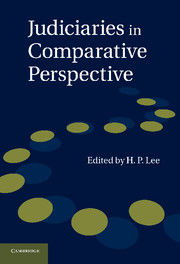Book contents
- Frontmatter
- Contents
- Contributors
- Foreword
- Preface
- Table of cases
- Table of statutes
- Part I
- Part II
- Part III
- 8 Judges’ freedom of speech
- 9 Judges and free speech in Canada
- 10 Judges and free speech in New Zealand
- 11 The judiciary and freedom of speech in South Africa
- 12 Judges and free speech in the United Kingdom
- 13 The criticism and speech of judges in the United States
- Part IV
- Part V
- Part VI
- Index
- References
12 - Judges and free speech in the United Kingdom
from Part III
Published online by Cambridge University Press: 07 September 2011
- Frontmatter
- Contents
- Contributors
- Foreword
- Preface
- Table of cases
- Table of statutes
- Part I
- Part II
- Part III
- 8 Judges’ freedom of speech
- 9 Judges and free speech in Canada
- 10 Judges and free speech in New Zealand
- 11 The judiciary and freedom of speech in South Africa
- 12 Judges and free speech in the United Kingdom
- 13 The criticism and speech of judges in the United States
- Part IV
- Part V
- Part VI
- Index
- References
Summary
On 22 July 1977, the Secretary of State for Scotland (Mr Bruce Millan) laid an order before Parliament removing Sheriff Peter Thomson from judicial office, the order to take effect on 6 December 1977. The said order was made under a statutory procedure which empowered the Secretary of State to remove a Sheriff on the ground that the latter was ‘unfit for office by reason of inability, neglect of duty or misbehaviour’, a power which could be exercised only after an investigation by the Lord President of the Court of Session and the Lord Justice Clerk, the two most senior judges in Scotland. In this case the complaint against Sheriff Thomson was that he had published a pamphlet entitled ‘Scottish Plebiscite – Report by Sheriff Peter Thomson’, proposing a referendum on Scottish Home Rule. This was not the first time Sheriff Thomson had engaged in political action. In 1974 he had circulated voting cards with questions about the establishment of a Parliament in Scotland, along with a return envelope addressed to himself as ‘The Returning Officer’. On being given notice of this earlier incident, the then Secretary of State requested an investigation to be conducted by the Lord President and the Lord Justice Clerk, with which, to the evident irritation of the senior judges, Sheriff Thomson refused to cooperate, or even acknowledge. The judges reported that although Sheriff Thomson’s conduct was ‘incompatible with his judicial office’, he was nevertheless not unfit for office ‘in view of his otherwise satisfactory service’, though they did add that if the Sheriff should engage in any similar activity in the future, ‘it might be extremely difficult to resist the conclusion that his fitness for his office was at an end’.
- Type
- Chapter
- Information
- Judiciaries in Comparative Perspective , pp. 237 - 256Publisher: Cambridge University PressPrint publication year: 2011
References
- 1
- Cited by

